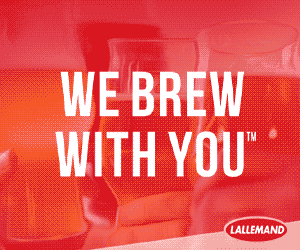Lagunitas Brewing Company’s New Dogtown Pale Ale Clone
Lagunitas Brewing Company’s New Dogtown Pale Ale Clone
OG = 1.060 FG = 1.012
IBU = 60 SRM = 8 ABV = 6.2%
INGREDIENTS
10.25 lbs. (4.7 kg) 2-row pale malt
1 lb. (0.45 kg) Vienna malt
0.5 lb. (0.23 kg) aromatic malt
0.5 lb. (0.23 kg) Victory® malt
0.25 lb. (113 g) Briess special roast malt
12 AAU Warrior® hops (60 min.) (0.75 oz./21 g at 16% alpha acids)
4 AAU Amarillo® hops (20 min.) (0.5 oz./14 g at 8% alpha acids)
4 AAU Cascade hops (20 min.) (0.5 oz./14 g at 8% alpha acids)
4 AAU Amarillo® hops (0 min.) (0.5 oz./14 g at 8% alpha acids)
4 AAU Cascade hops (0 min.) (0.5 oz./14 g at 8% alpha acids)
0.5 oz. (14 g) Amarillo® hops (dry hop)
0.25 oz. (7 g) Simcoe® hops (dry hop)
Wyeast 1335 (British Ale II) or Lallemand Nottingham yeast
2⁄3 cup corn sugar (if priming)
STEP BY STEP
Mill the grains, then mix with 15.6 qts. (14.8 L) of 163 °F (73 °C) strike water to reach a mash temperature of 152 °F (67 °C). Hold this temperature for 60 minutes. Vorlauf until your runnings are clear and lauter. Sparge the grains with 3.7 gallons (14.1 L) and top up as necessary to obtain 6 gallons (23 L) of wort. Boil for 60 minutes, adding hops according to the ingredient list and Irish moss if desired.
After the boil, chill the wort to slightly below fermentation temperature, about 66 °F (19 °C). Aerate the wort with pure oxygen or filtered air and pitch yeast. Ferment at 67 °F (19 °C) for seven days, then free rise to 72 °F (22 °C) until the completion of primary fermentation. Once the beer completes fermentation, reduce temperature to 32 °F (0 °C), add dry hops, and wait five days (or to taste). Then bottle or keg the beer and carbonate to approximately 2.25 volumes.
LAGUNITAS BREWING CO.’S NEW DOGTOWN PALE ALE CLONE
(5 gallons/19 L, partial mash)
OG = 1.060 FG = 1.012
IBU = 60 SRM = 9 ABV = 6.2%
INGREDIENTS
6.6 lbs. (3 kg) pale liquid malt extract
1.5 lbs. (0.68 kg) Vienna malt
0.5 lb. (0.23 kg) aromatic malt
0.5 lb. (0.23 kg) Victory® malt
0.25 lb. (113 g) Briess special roast malt
12 AAU Warrior® hops (60 min.) (0.75 oz./21 g at 16% alpha acids)
4 AAU Amarillo® hops (20 min.) (0.5 oz./14 g at 8% alpha acids)
4 AAU Cascade hops (20 min.) (0.5 oz./14 g at 8% alpha acids)
4 AAU Amarillo® hops (0 min.) (0.5 oz./14 g at 8% alpha acids)
4 AAU Cascade hops (0 min.) (0.5 oz./14 g at 8% alpha acids)
0.5 oz. (14 g) Amarillo® hops (dry hop)
0.25 oz. (7 g) Simcoe® hops (dry hop)
Wyeast 1335 (British Ale II) or Lallemand Nottingham yeast
2⁄3 cup corn sugar (if priming)
STEP BY STEP
Bring 1 gallon (4 L) of water to approximately 165 °F (74 °C) and submerge the crushed malts in grain bags for 45 minutes. Remove the grain bag, and wash grains with 1 gallon (4 L) hot water. Add liquid extract while stirring, and stir until completely dissolved and top up to 6 gallons (23 L). Bring the wort to a boil. Boil for 60 minutes, adding hops according to the ingredient list and Irish moss as desired.
After the boil, chill the wort to slightly below fermentation temperature, about 66 °F (19 °C). Aerate the wort with pure oxygen or filtered air and pitch yeast. Ferment at 67 °F (19 °C) for seven days, then free rise to 72 °F (22 °C) until the completion of primary fermentation. Once the beer completes fermentation, reduce temperature to 32 °F (0 °C), add dry hops, and wait five days (or to taste). Then bottle or keg the beer and carbonate to approximately 2.25 volumes.
TIPS FOR SUCCESS:
Brewmaster Jeremy Marshall notes that if you have to “miss” on this recipe, miss on the side of less hops rather than more. Having just finished a bottle of New Dogtown Pale Ale, I can personally verify that the malt character is both delightful and necessary, and overloading it with hops would be a mistake. If your version comes across as overly fruity or lacking in bready malt flavor and aroma, back down the hops until it comes out again!
And for your dry hops, Jeremy has a very specific suggestion: Look for the most oily, dankest Amarillo® you can get and “middle-harvest, citrusy” Simcoe®.
Written by Josh Weikert

This beer is pleasantly cosmopolitan, fusing European and American malts with American hops and English yeast to generate a firmly bitter and malt-balanced hoppy ale.



